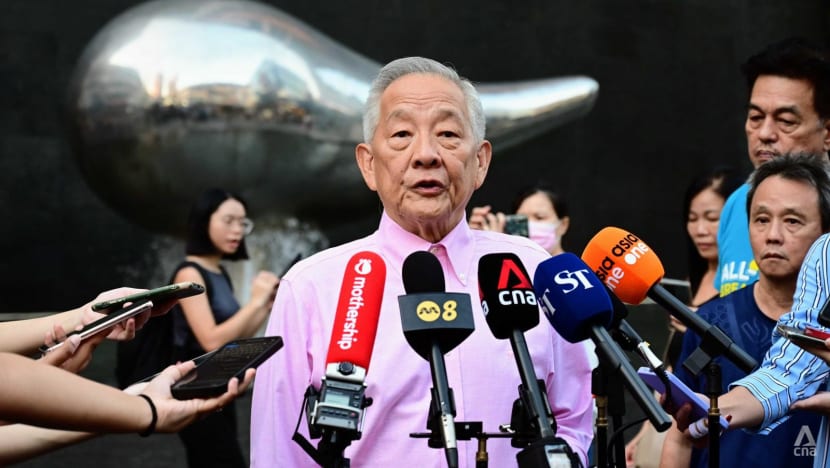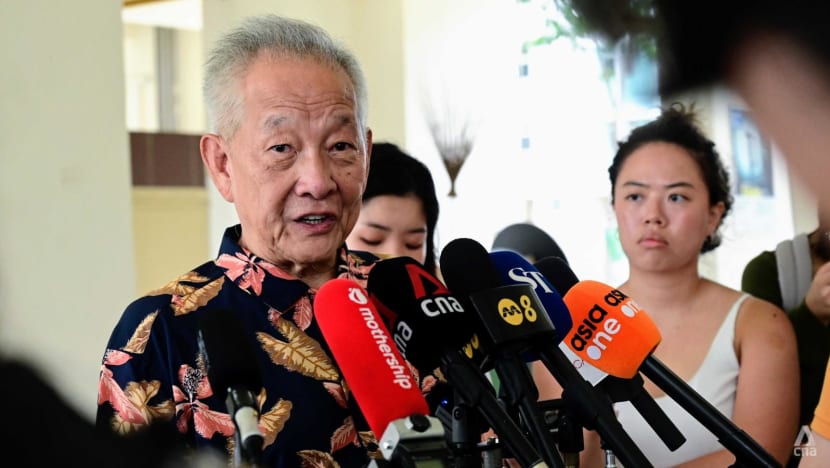Ng Kok Song says Tharman is 'taking the point too far' by comparing political affiliations with dependency on government
The former GIC chief investment officer was responding to rival candidate Tharman Shanmugaratnam, who said the presidential contest should be about the individuals who are running, their character and their track record.

Presidential candidate Ng Kok Song speaking to the media during a walkabout in Clementi on Aug 29, 2023. (Photo: CNA/Try Sutrisno Foo)
SINGAPORE: Mr Tharman Shanmugaratnam comparing past political affiliations with anyone who is dependent on the government is "taking the point too far", said fellow presidential candidate Ng Kok Song on Tuesday evening (Aug 29).
In a statement, Mr Ng said he was disputing comments made by rival candidate Mr Tharman during a televised forum on Monday night.
All three candidates – Mr Ng, Mr Tharman and Mr Tan Kin Lian – were asked about their impartiality during a live forum aired on CNA, with host and CNA presenter Otelli Edwards noting that each of the three is either linked to the establishment, the ruling party or the opposition.
In response, Mr Tharman had said that labelling candidates by their political affiliations is an "extremely simplistic" thinking that would have ruled out many past presidential candidates, such as former presidents Mr Ong Teng Cheong and Dr Tony Tan.
It would also rule out people who may not be members of a political party but who are senior civil servants who "owe their positions to bosses who are political figures", Mr Tharman said on Monday.
"Are they obligated to their bosses because of that? Not necessarily – it depends on the individual," Mr Tharman said.
"Let's say you have a private company, you have a construction company that depends on government contracts. Or you have a fund management company that depends on government monies. Does that make you not independent? Not necessarily. It depends on your character, your track record," he continued.
Mr Ng said on Tuesday evening that the remark about a fund management company "clearly" referred to him.
He is the executive chairman of Avanda Investment Management, an asset management company he co-founded in 2015 with two former GIC colleagues. In his statement on Tuesday evening, Mr Ng said he would "fully divest" his ownership of Avanda if elected.
"This is a worthwhile sacrifice to ensure the independence and impartiality of the office of the presidency," he said.
"More importantly, by comparing those with past political affiliations to anyone who is dependent on the government in some way, I am afraid Mr Tharman is taking the point too far in arguing his case.
"He might as well say all Singaporeans are beholden to the government because all of us are impacted by government policies in one way or another. There is a big difference between being a senior government leader and the rest of us."
Mr Tharman said on Monday night that the presidential contest should be about the individuals who are running, their character and their track record.
But Mr Ng said the Presidential Election goes "beyond the individual" and is about the system of governance that Singapore needs to safeguard its future.
“Mr Tharman has been a good minister. I am not disputing that at all. But I am disputing his comments that this elected presidency should be about individuals,” said Mr Ng in his statement.
“This Presidential Election goes beyond the individual. It is about the system of governance that Singapore needs to safeguard our future.”
The issue of independence has dominated this year’s Presidential Election, with the affiliations of each candidate coming under scrutiny over the past few days of campaigning.
POLITICAL AFFILIATIONS
On Tuesday morning, Mr Ng said that Singaporeans do not want a President who “is manipulated by either the governing party or by the opposition parties”.
“I think a non-partisan President is what Singapore needs,” he told reporters after a walkabout in Marine Parade.
Mr Tharman, 66, retired from all his positions in government in July and resigned as a member of the ruling People’s Action Party (PAP) to run for President.
Mr Tan Kin Lian, 75, is supported by a number of opposition politicians, including two former rivals in the last contested Presidential Election in 2011 – chairman of the Progress Singapore Party Dr Tan Cheng Bock and Mr Tan Jee Say, a member of the Singapore Democratic Party.
Dr Tan said he was supporting Mr Tan Kin Lian in his "personal capacity", while Mr Tan Jee Say is Mr Tan Kin Lian's proposer.
Mr Ng, 75, has repeatedly emphasised that he is the only candidate with no political affiliations, although he has been seen to have links with the establishment as a long-time public servant.
He is the former chief investment officer of GIC, Singapore's sovereign fund, and has spent a total of 45 years in public service, including at the Monetary Authority of Singapore.
Speaking to journalists on Tuesday evening, Mr Ng responded to a question about how his long career at GIC has caused a perception that he is not a truly independent candidate.
People who work in public service and political service are both part of the establishment, he said.
"But there is a huge difference between public service and political service. The difference is that the public service represents the continuity of the government, because political parties might come and go, but the public service remains," he added.
Most people in the public service are not members of any political party, he said, reiterating that he has never been a PAP member.
"TAKE THE PRESIDENT OUT OF POLITICS": MR NG
On Tuesday morning, Mr Ng reiterated that it is time for Singapore to “take the President out of politics” and that he is the only non-partisan candidate in the race.
“I have come forward in this election because I'm competent. I will know what questions to ask, I will know how to be vigilant and I'm non-partisan,” he said.
“I don't owe any political party any favours so I'll be able to discharge my responsibilities without fear or favour.”
He added that the country has “become more enlightened” about the idea of a non-partisan President. As that awareness grows, Singaporeans will "begin to understand that the Presidential Election is not a General Election".
“Of course, Singaporeans have got political affiliations. They want to support one political party versus another,” said Mr Ng.
"(But) Singaporeans will say: 'I will wait for the General Election to cast my vote, because that is truly the time to politicise elections, but not the elected presidency'."
In order to be effective as a "check and balance" to the government, the President must derive his or her mandate "directly from the people", said Mr Ng in his statement on Tuesday evening.
The Prime Minister and ministers are already selected from among Members of Parliament, he said.
"If the elected Presidency derives its mandate from, or in opposition to, these same set of political parties, then we might as well abolish the institution of the elected presidency,” he said, adding that having a Presidential Election that is a “proxy” to the General Election would be a waste of time and resources.
Singapore needs a “functioning system of check and balance” so that all voices are heard, said the former GIC chief investment officer in his statement on Tuesday evening.
“At the highest level of Singapore’s governance, the elected presidency is the check and balance on the government, against profligacy or corruption,” he said.
Mr Ng was asked on Tuesday morning about Mr Tan’s comment during CNA's live forum that he did “not believe in politicking” as that takes away time and resources from solving crucial problems facing Singapore.
"Already he has started on a very bad note," Mr Ng said.
“He does not want to politicise the Presidential Election, why did he ask Mr Tan Cheng Bock to support him? Isn’t that politicisation?”

REBUILDING TRUST
During the televised forum on Monday night, Mr Ng made the point about younger Singaporeans becoming more cynical and less trusting of the government.
Asked to elaborate on Tuesday morning, he said: “I think that some of the recent negative developments in regard to a falling short of standards among our political leaders just make young people feel that there’s a certain amount of hypocrisy in the system.
“At first, this was just cynicism but now, (it) is building up into distrust.”
He added that this sense of distrust is becoming "increasingly pervasive" within society and can be "very divisive".
“Because we are just separating people into two camps – pro-government, anti-government. That is not good for our society,” Mr Ng added.
“We have many challenges ahead of us, and I think the biggest domestic challenge is to restore trust and confidence in good government."
Mr Ng elaborated on his comments on Tuesday evening, and said it is because the ruling party is "perceived to be controlling all the national institutions and the key appointment holders that there is so much political cynicism among Singaporeans".
"Singaporeans feel PAP wants to have the final say in everything, and no matter what they say, PAP will decide and tell us what is best for us. Even on the recent issues debated in parliament, the PAP had the final say," he added.
The opposition is getting "more vocal", and the pro-PAP camp is "digging in", said Mr Ng.
"It is unhealthy and divisive. Why? Because we will lose sight that we are all Singaporeans, and we must be united."
A non-partisan candidate that comes from neither end of Singapore’s political spectrum will allow the country to “get out of this divisive paradigm”, said Mr Ng.
This person can represent the “full end” of the political spectrum, he added.




















